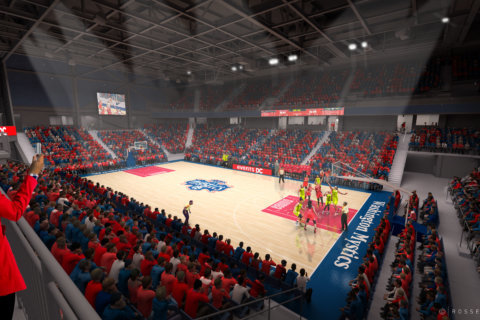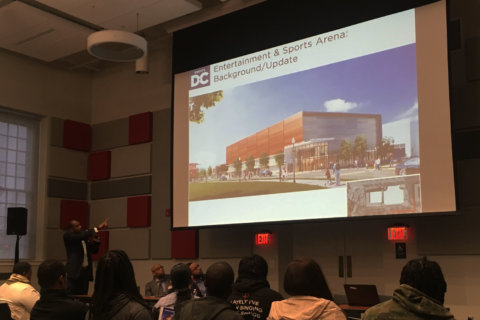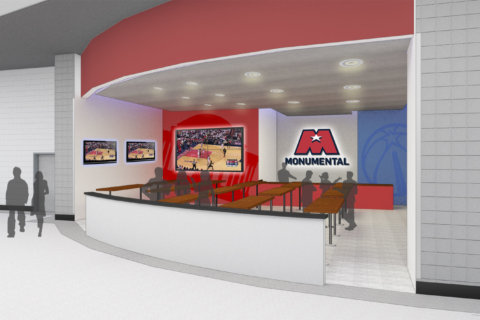FAIRFAX, Va. — Timing is everything.
The Washington Mystics weren’t expected to be this good, this fast. But a crucial injury to their best player at the worst time turned a promising playoff run — which included a first-ever trip to the WNBA Finals — into a slog and a three-game sweep at the hands of the Seattle Storm.
The Mystics’ success arrived two weeks early for their infrastructure, too. As the team took their morning shoot-around Wednesday, the official opening event for what will be their new home at the Entertainment and Sports Arena in Ward 8 was announced, just 10 days away. Later that night, Washington lost the decisive Game 3 of the Finals at George Mason’s Eagle Bank Arena in Fairfax, the team’s second different home-away-from-home.
Now in its 22nd season, the league continues its struggle for mainstream support. Case in point: can you imagine planned construction on Capital One Arena during either the NBA or NHL postseason, forcing the Wizards or Caps to play elsewhere? It’s unthinkable. And yet, that’s the situation in which the Mystics found themselves over the last couple weeks as a $40 million renovation of their now former home took place.
That construction schedule manifested in an unplanned postseason barnstorming of our local Atlantic 10 basketball arenas. The Mystics were relegated to Smith Center on the campus of George Washington for their home Semifinals games, but scheduling issues there pushed Wednesday night’s WNBA Finals game all the way out to Fairfax.
As if to drive the point home, that the Mystics’ wander through the postseason desert had reached its nadir, Seattle Storm guard Sue Bird poked her head out from the locker room after morning shoot-around in her green and yellow warmups, her visiting colors perfectly matching the paint and seats of Eagle Bank Arena. Despite the signs on the baselines, the rally towels, even the actual home wooden floor brought in for the game, the Mystics’ red, white and blue looked out of place.
But you wouldn’t have known it from the vibe in the arena. A near-capacity crowd packed in and lifted the mood into a frenzy early. Despite being down two-games-to-none, backs against the wall, energy and optimism abounded.
“Basically, we’ve played a lot of this season through a bunch of distractions,” said Mystics head coach Mike Thibault. “The construction in our arena at Capital One, being on the road most of July, playing at GW for the first round, and playing here at George Mason the second round. Our team has handled it. They’ve just said, ‘OK, whatever you put in front of us, we’ll deal with it.’”
Finally, Wednesday night, the obstacles — namely a truly deserving Seattle Storm team — became one too many. Already playing with superstar Elena Delle Donne nursing a knee injury suffered earlier in the playoffs, the team fell in an early hole and trailed by 16 at halftime. By the time starting center LaToya Sanders sprained her ankle while saving a loose ball, eventually getting carried to the locker room, the game had largely gotten away from Washington.
Before the game, Thibault seemed to understand what his team was up against; where it might struggle; what it could learn for next year and beyond.
“We had a lot of growing up to do and maturing to do and this group really hasn’t played together long as a group, he said. “And I’m excited that we have a wide open window for the future. We can build on this. If we win a championship this week, that will be great. But it won’t be the end of the world if we don’t.”
That inexperience showed up Wednesday night. The Mystics made the mistakes a young team makes, especially on the interior. Too many offensive rebounds (13) led to too many second- and third- chance opportunities. Too many short range shots left at the rim cost Washington crucial points.
Their final 43.5 shooting percentage belied the many missed shots in the run up to a fourth quarter where they hit nine-of-13 attempts — Washington was just 21-of-56 (37.5 percent) through the third.
That won’t take away from the most successful season in franchise history, though. The club’s first-ever trip to the WNBA Finals is even more impressive considering how much better the league is in 2018. Because whether or not non-fans have been paying attention, the WNBA has gotten really, really competitive. Still with just 12 teams, up from the original eight, the talent is highly concentrated, and continues to feed off the growth of the college game.
“The talent has definitely improved,” said Monique Currie, a 13-year veteran. “We still have a ways to go to make this league what we want it to be as players, just to be a professional league that we can be proud of.”
Part of that is simple recognition. While players haven’t been shy about standing up for themselves, they’ve gotten some help from their NBA counterparts this year, which is enormous given the men’s game’s meteoric rise both at home and abroad over the last half decade.
“I think exposure is the biggest thing,” said Currie about helping the WNBA game grow. “A lot of times, people who are not fans of the WNBA have never been to a game, never seen a game. A lot of times when I invite people out and they come to a game, they fall in love with the game.”
Those fans who attended the games at Smith Center and Wednesday’s tilt at Eagle Bank Arena got a glimpse of what that atmosphere might well be like next year at the ESA.
“We can really create something here, and I think we’ve really grown this fan base,” said Delle Donne. “I think it will be huge, having our own home, our fans will have a consistent place to show up and watch us play.”
Currie has played in almost any kind of arena you can imagine over her career, so she understands the value of a true home floor as well.
“To have their own place, not to worry about being bounced out in the playoffs, that’s something that will be in the past for the Mystics, and I think that’s a great thing,” she said.
And while it will be a much smaller building than they’ve been used to for years, it will be much more like the ones they’ve played in the last couple weeks. Whether in the wins at Smith Center or the loss Wednesday night at Eagle Bank Arena, those have provided the kind of home court advantage that every team and fan base wishes for.
“It’s a small arena,” said Delle Donne of the 4,200-seat ESA, which will be the lowest capacity in the league. “So it will be loud, crowded, and kind of have that playoff atmosphere all year long.”







